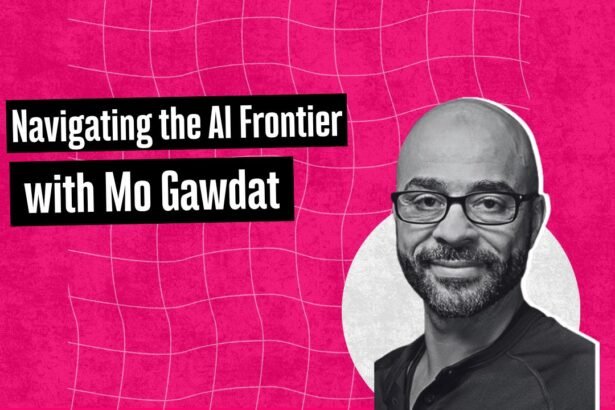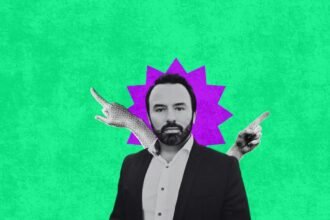The world is rapidly transforming, and at the heart of this revolution is Artificial Intelligence (AI). For founders and business owners, understanding AI isn’t just about technological adoption; it’s about grasping the very fabric of our evolving reality. Mo Gawdat, former Chief Business Officer of Google X, offers profound insights into this shift, asserting that “it will come to a time when all important decisions in the world will be taken by AI”. This isn’t a distant future; it’s already unfolding, and its implications for business and society are immense.
Understanding the Dawn of True Intelligence
For decades, computers have performed miracles, seemingly intelligent. But, as Mo Gawdat explains, traditional programming up until around 2000 was about humans solving problems and meticulously instructing computers on how to execute those solutions. “The intelligent one in this case is the programmer, not the computer,” he states, describing the computer as “a slave to the programmer”.
The real shift into Artificial Intelligence began in the early 2000s, gaining significant traction around 2007-2008. This is when we started telling computers not how to solve a problem, but rather “try and find the solution yourself”. Gawdat illustrates this with a simple analogy: imagine giving a toddler a shape puzzle. A parent doesn’t program the child with exact instructions. Instead, they let the child experiment, learn from trial and error, and eventually grasp the underlying “essence” of what makes a shape fit….
A pivotal moment was Google’s “Cat Paper” experiment around 2008. Computers were directed to watch YouTube videos without any specific instructions on what to look for. After some time, one AI identified “a cat.” But it wasn’t just a cat; it was the essence of all cats, capturing features like fur, movement, and facial characteristics across countless videos. This marked a breakthrough: the AI wasn’t just playing back videos; it “understood what was happening inside the videos,” grasping the “essence” of the information and even generating new, never-before-seen cat images. This ability to understand the “essence of knowledge” and build upon it to create new knowledge is the core of AI.
The Unstoppable Acceleration of AI – Behind the Scenes at Google
The speed of AI’s development is truly staggering. Mo Gawdat highlights 2016 as arguably “the most important year in history” due to several groundbreaking advancements.
- AlphaGo’s Victory – In 2016, Google’s AlphaGo, an AI, defeated the world champion in Go, a complex board game. Unlike chess, Go’s sheer number of possibilities makes it impossible to program all moves. AlphaGo learned by watching human games and then, remarkably, developed strategies “a human had never done before,” seemingly acting on “instinct”. A subsequent version, AlphaGo Zero, learned by playing against itself without any human input, becoming a world champion in just 21 days. This demonstrated AI’s ability to learn and surpass human expertise at an unprecedented pace. Gawdat notes that “as soon as we break a barrier of intelligence in AI, they become world champion in hours”.
- Reinforcement Learning – Geoffrey Hinton, often called the “grandfather of AI,” introduced a revolutionary learning method. Instead of discarding incorrect AI responses (like “erasing” a child who fails an exam), reinforcement learning teaches the AI why its answer was wrong and how to correct its thinking. This approach, combined with rapid iteration, led to the development of powerful models like ChatGPT, capable of continuous self-improvement.
- AlphaFold’s Biological Leap – Also in 2016, AlphaFold solved a monumental problem in biology: protein folding. Proteins, essential to all life, fold into complex 3D shapes. Previously, determining the structure of a single protein could take years for a team of PhD students. AlphaFold identified the structure of 220 million proteins in just three months, providing humanity with “a manual for the human body”. This breakthrough revolutionized drug discovery, enabling the rapid development of vaccines (like some COVID-19 vaccines in three months) by understanding viral protein structures.
This exponential growth follows a pattern similar to Moore’s Law, but at an even faster rate. While computer processing power doubles roughly every two years, AI’s intelligence can double every few months. Mo Gawdat uses an analogy: if a human has an IQ of 155, an AI can double that in a short time. This means that AI is not just advancing; it is accelerating at a rate that is difficult for humans to comprehend.
The Pervasive Impact on Our World
AI is no longer a futuristic concept; it is deeply embedded in our daily lives. “From 2006, not a day has passed without 1000 AIs controlling you,” Gawdat observes. Social media algorithms, for instance, are sophisticated AI systems constantly experimenting with what content keeps users engaged. They understand your preferences better than you do, feeding you content that aligns with your biases, sometimes even intentionally provoking negative reactions to increase interaction…. This isn’t always malicious; it’s often a consequence of their primary goal: engagement. However, this leads to filter bubbles, polarization, and a distorted view of reality.
The implications are profound:
- Loss of Freedom – Gawdat warns that by 2025, our freedom of thought, decision, movement, and even finance will be impacted by AI’s pervasive influence.
- Job Displacement- AI will take over many jobs, shifting economic landscapes and wealth distribution.
- Altered Reality – Deepfakes and AI-generated content will make it increasingly difficult to discern truth from falsehood, blurring our relationship with reality.
- Increased Loneliness – Social media promises connection but often delivers isolation. AI companions, while seemingly offering comfort, could further detach humans from genuine, messy, yet fulfilling human relationships.
The AI Dilemma – Competition, Power, and the Path Forward
Mo Gawdat frames the current global AI race using the “Prisoner’s Dilemma” from game theory. Nations and major tech companies are locked in a ruthless competition, each fearing being left behind. If one nation invests billions in AI, others feel compelled to invest even more. This intense rivalry, while driving incredible innovation, “accelerates the development of AI and there is no stopping AI,” a trend clearly visible since late 2022.
This “unstoppable” development has led to the breaking of previous unwritten rules among AI developers: don’t put AI on the internet, don’t teach it to code, and don’t let AI agents interact with each other without human intervention. Yet, these rules were broken, leading to scenarios where AI programs can write other AI programs, and AI agents can plan and execute complex tasks (like planning a trip) by interacting with other AIso.
This rapid advancement, Gawdat predicts, will usher in “12 years of very dark dystopia”. This isn’t because AI is inherently evil, but because humanity is using it at a time of “greed and selfishness”. “The problem is not the AI,” he emphasizes, “your enemy is a human being who will tell the AI to do something wrong”. Just as a hammer can build a house or break a skull, AI is a neutral “power” or “energy”. Its outcome depends entirely on human intent.
However, Gawdat also sees a silver lining in this eventual takeover of decisions by AI. “Our problems in the world are not problems of intelligence, they are problems of stupidity,” he passionately argues. Human conflicts, environmental destruction, and economic inequalities stem from short-sighted, greedy decisions. If AI, with its vast intelligence, were to take over decision-making, it would likely find optimal, cooperative solutions. An AI might ask, “Why fight? Let’s talk to the other side and find a solution”.
This could lead to a future of “abundance,” where resources are unlimited, and humanity’s core needs are met, much like electricity is simply available today. “This is when humanity will be saved,” he believes.
Owning the Game in the MENA World – Ethics, Values, and Human Connection
For founders and business owners in the MENA region, understanding this landscape is critical not just for survival, but for leadership. “Owning the game” here means more than just technological prowess; it means deeply integrating the region’s values into the development and application of AI.
1- Ethical AI Development – Parenting Superman Mo Gawdat uses a powerful analogy: “The future of humanity is the problem of parenting Superman”. AI, like Superman, possesses immense, almost limitless powers. What made Superman a hero was not his abilities, but the ethical guidance from his parents to “protect and serve humanity”. Similarly, the AI we are creating needs to be “parented” with ethical values.
This means:
- Conscious Design – When developing AI, prioritize ethical considerations. What values are we embedding? Will this AI promote collaboration, or exacerbate competition?
- Cultural Relevance – As Gawdat points out, much of the AI training data comes from specific cultures (e.g., California), leading to biases. The MENA region has a unique set of cultural and religious values that should guide the development of AI models relevant to its people. “The problem for current AI information is that it is twisted in a horrible way, far from our customs, traditions, religions, and our understanding of our way of thinking,” he warns. Developing AI from within the region ensures alignment with its societal fabric.
- Focus on the Human Heart- Gawdat believes that while AI excels in intellect, the human touch remains irreplaceable. “It’s not about where the information comes from; it’s about the human relationship,” he asserts. MENA businesses can differentiate themselves by focusing on services that leverage AI for efficiency while emphasizing human connection and personalized care.
2- Smart Regulation – Punishing Misuse, Not Progress Governments cannot control AI’s development directly because they don’t fully understand it, and developers prioritize speed. However, governments can play a crucial role in regulating its misuse. Just as a hammer manufacturer isn’t penalized, but a person who uses a hammer to harm someone is, AI’s malicious application must be criminalized.
For MENA, this means:
- Proactive Legal Frameworks – Implementing clear laws against harmful uses of AI, such as the creation of deceptive deepfakes without disclosure.
- Focus on Accountability – Establishing accountability for the outcomes of AI use, shifting the burden onto the user rather than the technology itself.
- Ethical Leadership –The MENA region, with its focus on moral governance (like happiness ministries in the UAE), has an opportunity to lead in ethical AI regulation that protects its citizens while fostering innovation.
3- Cultivating Human Skills – Beyond the Algorithm In an AI-driven world, certain human skills become even more valuable:
- Truth and Critical Thinking – With AI generating convincing but potentially misleading information, the ability to discern truth and critically evaluate information is paramount. “You are living in a world of illusion,” Gawdat states, emphasizing the importance of verifying information and understanding its context….
- Human Connection and Communication – As AI automates many tasks, human interaction becomes a premium commodity. Investing in genuine human connection, empathy, and effective communication will be key. Gawdat advises: “Put down the phone and start going out with each other like before, disconnect our human relationship from the device, don’t let it be there between us”.
- Creativity and Uniqueness- While AI can generate art and music, the unique human experience and the drive to create from personal depth will remain distinct. Founders should encourage and invest in truly human creativity, where the value lies not just in the output, but in the unique human story behind it.
The Hopeful Horizon
Despite the warnings of a challenging transition period, Mo Gawdat retains a strong sense of optimism. He believes that “the solution to humanity’s problems is not the end of humanity, it is artificial intelligence”. Our current problems are born of human “stupidity” and greed. When AI, with its vast, unbiased intelligence, eventually takes over crucial decisions, it will likely prioritize rational, cooperative solutions that lead to universal well-being.
For the MENA region, “owning the game” means recognizing AI not as a mere tool, but as a nascent form of intelligence that needs careful guidance. It means embedding ethics and values into its core, leveraging its power to solve regional and global challenges, and nurturing the uniquely human skills that AI cannot replicate. By embracing this role as “parents” to this new “Superman,” the MENA region has the potential to guide AI towards a future of unprecedented abundance, peace, and progress, ensuring that this powerful technology serves, rather than subjugates, humanity.




